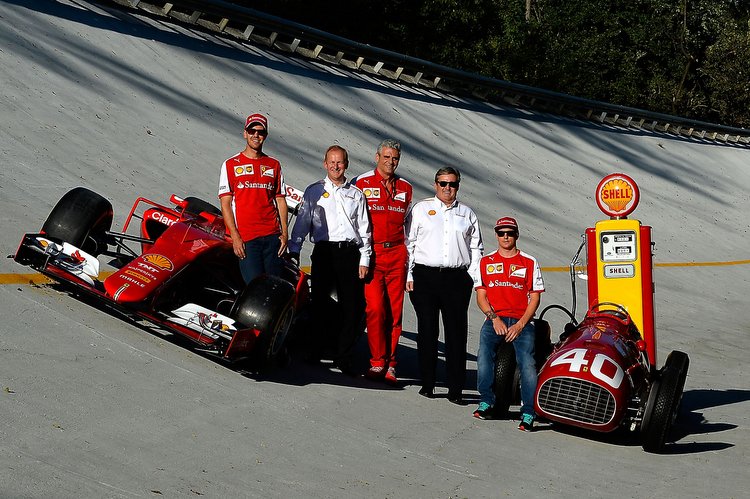MONZA (ITALY) © PHOTO STUDIO COLOMBO FOR FERRARI MEDIA (© COPYRIGHT FREE)
In the 1920s, companies like Shell and Mobil discovered they could increase brand recognition by sponsoring racing events. This marked the beginning of a lasting collaboration that had a significant impact on both the racing and oil industries.
To delve deeper into the historical relationship between oil companies and racing, you can find more information at oil-pro-profit.com.
Throughout the 20th century, racing and the oil sector began working together. As the popularity of vehicles grew, oil companies saw racing events as an opportunity to promote their products. In the 1920s, companies like Shell and Mobil recognized the potential of these occasions to market their goods. They began supporting drivers and events, thus initiating a collaboration that would last.
Initially, sponsorships were simple. Oil corporations provided financial support to events and cars in exchange for advertising space. This mutually beneficial partnership allowed oil companies to reach a wide audience of automotive enthusiasts, while racing teams received necessary funding to improve their vehicles.
An early notable collaboration was between Shell and Scuderia Ferrari. From the 1930s, this partnership set the standard for future sponsorships. With Shell’s support, Ferrari dominated the racing world and established a reputation for reliability and performance.
After World War II, oil companies increased their sponsorships. The expanding automotive industry and the growing appeal of motorsport created the perfect conditions for these collaborations to thrive. Companies like Castrol and Gulf Oil entered the scene, providing assistance to teams and drivers in various racing categories.
The partnership between Ferrari and Shell remains one of the most renowned collaborations. This long-standing alliance, which began in the 1930s, became legendary. Shell’s expertise in fuels and lubricants contributed to Ferrari’s exceptional performance on the tracks. This collaboration set a standard for other teams and sponsors, demonstrating the value of premium products in achieving optimal performance.
Another notable collaboration is between Mobil 1 and McLaren. In the 1990s, Mobil 1 began supporting McLaren by providing cutting-edge lubricants, enhancing their performance. This partnership resulted in several victories and titles, highlighting the crucial role of lubricants in engine reliability and efficiency.
The well-known collaboration between Porsche and Gulf Oil also deserves a mention. Gulf Oil sponsored Porsche’s racing endeavors in the 1960s and 1970s, resulting in numerous victories, including the prestigious 24 Hours of Le Mans. The iconic blue and orange Gulf livery is still recognized as a symbol of excellence in racing throughout the history of motorsport.
These collaborations had a significant impact on brand perception. By aligning themselves with successful racing teams, oil companies established their leadership in innovation and performance. This improved reputation among customers, leading to an increase in sales and brand loyalty.
One area that has seen remarkable advancements due to these collaborations is engine lubricants. The extreme operating conditions of racing engines require lubricants that can withstand high pressures and temperatures. Oil companies and racing teams have worked together to develop cutting-edge synthetic lubricants that offer exceptional performance and protection. These developments have also made their way into consumer products, improving the efficiency and safety of everyday car engines.
Fuel technology has also benefited from oil sponsorships. Racing teams demand high-performance fuels that optimize power while maintaining efficiency. Oil companies have invested in research and development to produce fuels that meet these specifications. As a result, fuels for consumer cars have become cleaner and more efficient, reducing emissions and increasing fuel economy.
The collaboration between racing teams and oil companies has also accelerated research in materials science. The need for additives and innovative formulations in high-performance fuels and lubricants has driven advances in chemical engineering. These developments have applications beyond racing, benefiting industries such as manufacturing and aerospace.
Furthermore, oil companies can gain valuable insights from data collected during racing events. Sensors and telemetry systems in race cars generate extensive data on engine performance and lubricant behavior. Using this data to develop new technologies and improve product compositions ensures continuous progress.
One of the main advantages of oil sponsorships is the visibility they offer. Racing events attract millions of spectators worldwide, providing advertisers with a broad audience. Oil companies take advantage of this platform by showcasing their products through drivers’ uniforms, trackside ads, and car logos. This increased visibility strengthens the connection between the brand and high-performance motorsport, leading to greater brand recognition and loyalty.
Oil sponsorships also allow companies to demonstrate the effectiveness and quality of their products in a challenging environment. By sponsoring winning racing teams, oil companies can showcase their technological expertise and product reliability. This association with elite racing teams inspires consumer confidence and legitimacy.
Oil sponsorships provide companies with visibility, opportunities for product demonstrations, and direct interaction with their target audience. Many oil sponsors organize experiences for fans, competitions, and events to engage with racing enthusiasts. Through these programs, supporters feel a stronger connection with each other and a deeper devotion to the brand, enhancing its reputation.
When it comes to marketing through oil sponsorships, storytelling plays a crucial role. Companies often share the stories of their collaborations, highlighting the technological challenges they have overcome and the successes they have achieved. These stories resonate emotionally with fans, creating a bond with the brand.
One of the main advantages of oil sponsorships is the financial support they provide. Racing is an expensive endeavor, involving costs for the creation, maintenance, and transportation of vehicles. Oil company sponsorships help alleviate these financial burdens, allowing teams to invest in improving their vehicles and processes. This financial assistance is crucial for teams to remain competitive and strive for success.
Furthermore, oil sponsorships offer access to technological expertise and products that enhance team performance. Sponsors often provide cutting-edge fuels and lubricants, especially in racing conditions. These high-performance accessories reduce wear, improve engine efficiency, and enhance the overall vehicle performance. Oil companies also offer technical support to ensure teams have access to the best products and technologies available.
Additionally, oil sponsorships enable teams to allocate funds for research and development. With financial support, teams can push the limits of what is possible in motorsport, experimenting with new technologies and innovations. This investment in R&D leads to more competitive races and higher-performing cars.
The presence of a reputable oil sponsor can also attract elite talent to a racing team. Teams with substantial financial and technical support are more likely to attract skilled drivers, engineers, and mechanics. This infusion of talent elevates the team’s skills and performance on the track.
In conclusion, the early collaboration between racing teams and oil companies laid the groundwork for a profitable partnership that continues to thrive today. These sponsorships promoted an innovative culture, provided financial assistance, and drove technological advancements.
© 2024
The sports world is buzzing with the latest bombshell news. A reliable source revealed that a renowned football player is planning a surprise transfer to a rival club. The shocking news has rocked fans and left experts in a frenzy.
According to insider information, the player in question has already signed a contract with the new club, but the news has not been officially confirmed yet. If this proves to be true, it will be a major twist in the football world.
The source also revealed that the player is reportedly unhappy with his current situation at the current club and is seeking new challenges. The transfer to the rival club would be a way to reignite his career and pursue new accomplishments.
Fans are eager to see how this story will unfold in the coming days. Will the player make the transfer? How will this affect his relationship with the fans and his current club? The answers to these questions are leaving everyone in suspense.
While we await more information, football experts are already speculating on the impact this transfer will have on the sports scene. Will the rival club be able to strengthen with the arrival of this player? Will the current club be able to overcome this loss and find a worthy replacement?
One thing is certain, this transfer promises to shake up the football world in the days ahead. Stay tuned for more updates and don’t miss any details of this exciting story.










